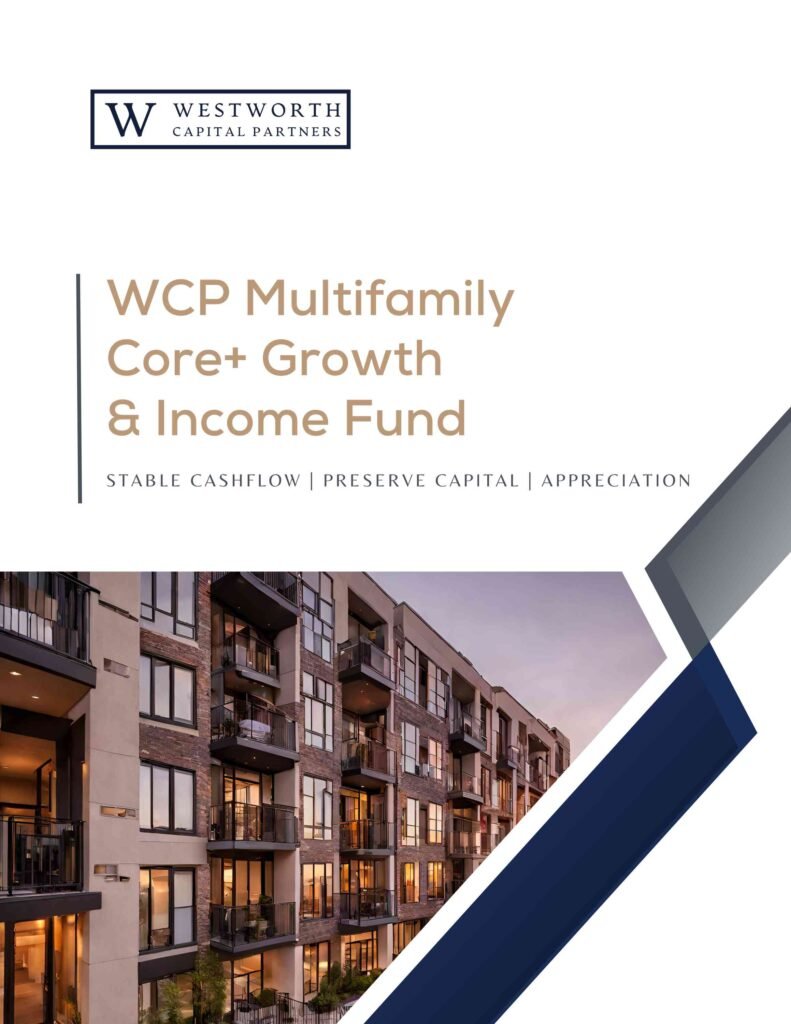WCP Multifamily Core+
Growth & Income Fund
ACCREDITED AND SOPHISTICATED INVESTORS ONLY
INCOME-PRODUCING PROPERTIES | MULTI-FAMILY
WCP Multifamily Core+ Growth & Income Fund (“Fund”) is a private real estate fund, which seeks to balance cash flow stability, capital preservation, and long-term capital appreciation while providing superior risk-adjusted returns to investors.
Our goal is to identify attractive income-producing multifamily assets for you and preserve capital and spread the risk across investor-friendly Midwest and Sunbelt states.
Given Westworth Capital’s intimate knowledge of the Midwest and the Sunbelt apartment market, the management team has the highest level of conviction in its ability to execute the business plan and deliver the targeted returns to investors.
POTENTIAL BENEFITS
If you are looking to add Core+ CRE (Commercial Real Estate) assets or funds to your portfolio, you may return the following benefits:
- Investing in our Core+ fund can help diversify your portfolio by giving them access to offerings not found in public markets, and typically monetarily out of reach for most individuals investors to participate in. The two assets in this fund make up different types of characteristics, geographies, and seller motivation. Portfolio diversification can help you reduce risk and provide stability in support of your estate planning goals.
- The goal of our Core+ fund is to hold assets that can weather economic downturns, market volatility and inflation, while providing you with a steady income stream and modest growth on investment.
- Commercial real estate has a history of long-term appreciation, even during economic downturns. This appreciation can provide long-term benefits to your portfolio.
- Investing in our fund gives you access to a team with decades of combined industry experience in investing, managing and dispositioning all types of CRE assets. Our expertise can be especially valuable for most investors who do not have the experience or time required to effectively manage their own reaal estate portfolio.
- Investing in Core+ CRE funds can provide you with numerous tax benefits. For example, one benefit includes depreciation deductions, which can help to reduce the taxes owed on any rental income generated.
- You expect transparency, and we agree. We disclose our financial information to comply with regulations set forth by our state and federal government bodies.
DIFFERENCE BETWEEN CORE AND
CORE+ (PLUS) STRATEGIES
Core Real Estate Strategies
Core real estate strategies represent the most conservative blend of risk and return in the private real estate segment. They invest in core properties, which tend to be built exceptionally well, located in great areas, are burdened by very few deferred maintenance requirements, and are income-producing.
Core assets typically hold high-quality tenants already in place with long-term leases. These properties are usually new or very close to new, with minimal capital expenditure needed each year. Investors can expect few—if any—surprises with these assets.
Core Plus Real Estate Strategies
Core plus real estate strategies invest in properties that are very similar to core properties, but, for one reason or another, they don’t quite fit into the most conservative category. They are typically well leased—maybe not leased to the absolute highest quality tenants, as you would expect with a core asset, but the tenant base is still creditworthy and there is a history of leasing the property successfully. Most core plus assets are stable, meaning they don’t require the buyer to complete extensive renovations or figure out a way to get from 50% occupied to 95% occupied among other typical challenges that value-add and opportunistic projects face.
$50K
MINIMUM INVESTMENT
$20M
MAXIMUM OFFERING



*The following assets listed are identified as potential projects to live in the fund. These can be subjected to change due to numerous internal and external business variables that can potentially impact strategy, decision-making and other processes.
Objective
With your investment, our goal is to generate passive income and modest returns for you.
Target Audience
Investors seeking to add alternative investments to their portfolios that can potentially return passive income and modest growth on their investment.
Diversification
The fund seeks diversification by purchasing income-producing properties at a discount. Potential property type: Multifamily.
We track sponsors and owners of income-producing properties under distress that need to sell their assets quickly.
The plan is to purchase these assets at below replacement cost, or with existing cash flow requiring only minor renovations and updates.
Market volatility, inflation, and higher interest rates lead to a wave of bank closures and economic disruptions. Many institutions are now facing unstable situations due to overexposure to various asset strategies such as tech, crypto, venture, and other mismanaged assets. As a result, they are feeling the pressure to sell their assets at discounted rates. This provides a unique opportunity for you to acquire income-producing assets at lower rates, with anticipated deal opportunities heading into the second half of 2024.
4 Investment Strategies
There are typically 4 strategies in commercial real estate investing. Core Plus (Core+) is where the WCP Multifamily Core+ Growth & Income Fund aligns.
More Details
Property tends to be well-built in a great location with little deferred maintenance requirements and high-quality tenants already in place on long-term leases.
More Details
Includes properties with a good—not great—location, stable income, high-quality tenants, slightly dated finishes, and low to moderate vacancy rates.
More Details
Commonly, value-add properties that have little to no cash flow at acquisition. Properties are in fair to good locations, dated finishes, medium to high vacancy levels, and some amount of deferred maintenance that must be addressed.
More Details
There is greater risk in buying less-established companies; however, the upside can be significantly higher than buying mature large-cap stocks. This can include developing something from scratch (ground-up development), repurposing a building from one use to another (adaptive reuse), and / or winning entitlements for raw land.
THREE-CLASS RETURN STRUCTURE
Westworth Capital will be offering three classes of equity, allowing investors to align their dollars with their investment goals and preferences. Investors have the opportunity to invest in any class of equity.
Class A has Targeted Returns as follows: Average Annual Return of 20%, Preferred Return of 6%, and Equity Multiple of 2.0x, and Internal Rate of Return of 17%
Class B has Targeted Returns as follows: Average Annual Return of 21.4%, Preferred Return of 7%, and Equity Multiple of 2.1x, and Internal Rate of Return of 17.3%
Class C has Targeted Returns as follows: Average Annual Return of 23%, Preferred Return of 8%, and Equity Multiple of 2.15x, and Internal Rate of Return of 18.4%

TARGETED INVESTOR RETURNS
Class A
Class B
Class C
ABOUT THE PROGRAM

VIEW FURTHER OFFERING DETAILS AND DISCLOSURE DOCUMENTS
GET IN TOUCH
Who is an accredited investor?
An accredited investor is a person who has at least $200,000 in personal income, or $300,000 for combined incomes, over the past two years, with the expectation of the same or higher income in the current year. People with a net worth of more than $1 million singly, or with their spouse, excluding the value of their home, also qualify.

No Offer of Securities – Disclosure of interests. Under no circumstances should any material at this site be used or considered as an offer to sell or a solicitation of any offer to buy an interest in any investment. Any such offer or solicitation will be made only by means of the Confidential Private Offering Memorandum relating to the particular investment. Access to information about the investments are limited to investors who either qualify as accredited investors within the meaning of the Securities Act of 1993, as amended or those investors who generally are sophisticated in financial matters, such that they are capable of evaluating the merits and risks of prospective investments.
